常见短暂性动词与延续性动词的对照一览表(初中)
中考英语延续性动词

borrowed→have kept,
bought→have had,
began/started→have been on,
died→have been dead,
moved to→have lived in,
finished→have been over,
joined→have been in/been a member of,
延续性动词
中文名称
延续性动词/非点动词
英文名称
DurationalVerbs
定义
动词按其动作发生的方式、发生过程的长短,可分为延续性动词和终止性动词。延续性动词表示动作不但可以延续,而且可以产生持久的影响。
例词
be,have,keep,know,learn,lie,live,read,sing,sleep,stand,stay,wait,walk,watch等。
相关链接
现在完成时 短暂性动词
opened sth.→have kept sth. open,
fell ill→have been ill,
got up→have been up,
caught a coecame ---have been,
came back ---have beenback,
特点
1.延续性动词可用于由how long提问的句子和含有for+一段时间的完成时态中。
例如:He has lived here for a week.他有一个星期没离开这里了。
注意事项
短暂性动词与延续性动词对应的常用动词有:
came here→have beenhere,
wentthere→have beenthere,
短暂性动词和延续性动词
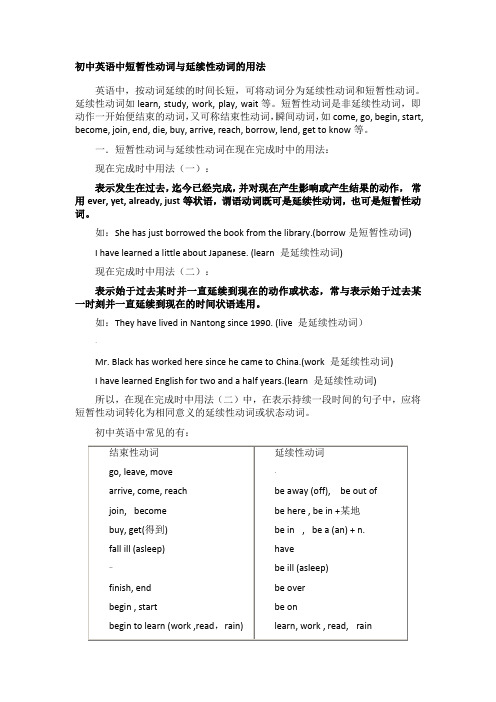
初中英语中短暂性动词与延续性动词的用法英语中,按动词延续的时间长短,可将动词分为延续性动词和短暂性动词。
延续性动词如learn, study, work, play, wait等。
短暂性动词是非延续性动词,即动作一开始便结束的动词,又可称结束性动词,瞬间动词,如come, go, begin, start, become, join, end, die, buy, arrive, reach, borrow, lend, get to know等。
一.短暂性动词与延续性动词在现在完成时中的用法:现在完成时中用法(一):表示发生在过去,迄今已经完成,并对现在产生影响或产生结果的动作,常用ever, yet, already, just等状语,谓语动词既可是延续性动词,也可是短暂性动词。
如:She has just borrowed the book from the library.(borrow是短暂性动词)I have learned a little about Japanese. (learn 是延续性动词)现在完成时中用法(二):表示始于过去某时并一直延续到现在的动作或状态,常与表示始于过去某一时刻并一直延续到现在的时间状语连用。
如:They have lived in Nantong since 1990. (live 是延续性动词)、Mr. Black has worked here since he came to China.(work 是延续性动词)I have learned English for two and a half years.(learn 是延续性动词)所以,在现在完成时中用法(二)中,在表示持续一段时间的句子中,应将短暂性动词转化为相同意义的延续性动词或状态动词。
初中英语中常见的有:1. His grandfather has died for ten years.(F)His grandfather has been dead for ten years.(T)2. My brother has joined the army for five years.(F)My brother has been in the army for five years.(T)My brother has been an armyman for ten years.(F)|3. He has gone away for a week.(F) He has been away for a week.(T)4. The film has begun for fifteen minutes.(F)The film has been on for fifteen minutes.(T)但是,短暂性动词的现在完成时的否定形式可以表示一种延续的状态,因此可以和表示一段的状语连用。
短暂性动词与延续性动词的转换
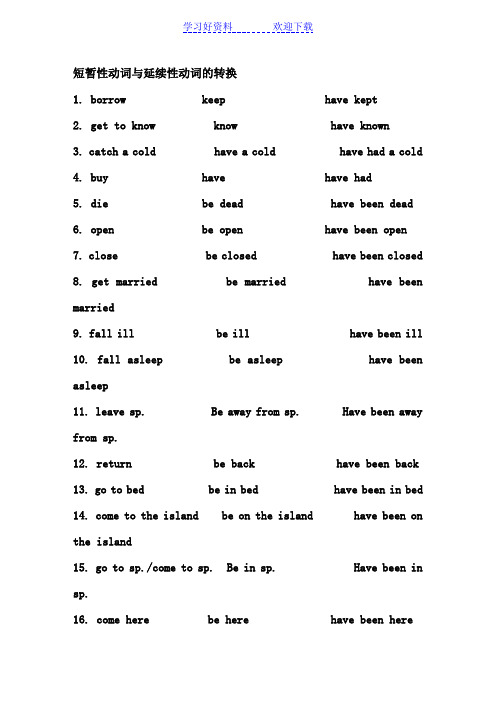
短暂性动词与延续性动词的转换1. borrow keep have kept2. get to know know have known3. catch a cold have a cold have had a cold4. buy have have had5. die be dead have been dead6. open be open have been open7. close be closed have been closed8. get married be married have been married9. fall ill be ill have been ill10. fall asleep be asleep have been asleep11. leave sp. Be away from sp. Have been away from sp.12. return be back have been back13. go to bed be in bed have been in bed14. come to the island be on the island have been on the island15. go to sp./come to sp. Be in sp. Have been in sp.16. come here be here have been here17. go there be there have been there18. go out be out have been out19. get up be up have been up20. start/ begin be on have been on21. finish/ end be over have been over22. become be have been23. join be a member of have been a member ofBe in have been inrrive→be here begin(start)→be ondie →be dead come back→be backleave →be away (from) fall ill(sick, asleep)→beill(sick, asleep)get up→be up go out →be outfinish →be over put on →wear 或be onopen →be open join →be in或 be a member of…close →be closed go to school→be a studentborrow →keep buy/get →have catch(a cold)→ have(a cold) get to know →knowbegin to study→study come to work→workmove to → live in finish/end → be overcome to → be in sit down → be seated marry → be married dress → be dressed等短暂性动词和延续性动词可以从字面上理解,持续的动作就是延续动词,反之就是瞬间动词(短暂动词),这个有这种感觉还是很好理解的,你看看下面的浅谈吧延续性动词: live,run,stay,clean,play,hold,watch,teach,read,study,teach, eat,drink,write,dance, sing,smoke瞬间性动词:open,stop,like,love,die,win,close,shot,begin,startenter,finish1、终止性动词:表示不能延续的动作,即动作发生后立即结束。
英语短暂性动词和延续性动词
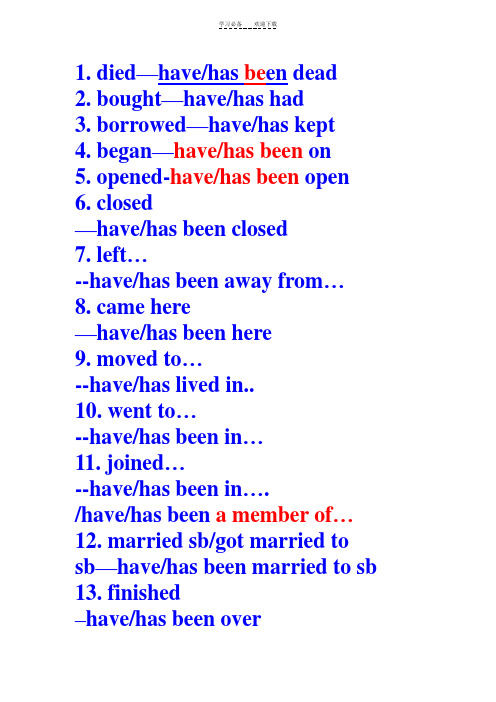
1. died—have/has be en dead2. bought—have/has had3. borrowed—have/has kept4. began—have/has been on5. opened-have/has been open6. closed—have/has been closed7. left…--have/has been away from…8. came here—have/has been here9. moved to…--have/has lived in..10. went to…--have/has been in…11. joined…--have/has been in…./have/has been a member of…12. married sb/got married to sb—have/has been married to sb 13. finished–have/has been over14. made/became friends—have/has been friends15. began to teach—have/has taught16. lose (lost)—haven’t/hasn’t had17.become (became)—have/has been ******************************* * He went to London in 1990. He is still in London now.→He has been in London since 1990. * I borrowed the book two weeks ago. →I have kept the book for two weeks/since two weeks ago.It is two weeks since I borrowed the book.●He joined the League two yearsago. = It is two years since hejoined the League.= He has been in the League for two years/ since two years ago.同义句(用两种方法变):1.The film began ten minutes ago. It is …since….It is ten minutes since the film began. The film has been on for ten minutes/since ten minutes ago.2.It is three days since he left.He left three days ago.He has been away from here for three days/since three days ago.3.He came here half an hour ago,and he is still here now.It is half an hour since he came here. He has been here for half an hour./since half an hour ago.4.Mary married Tom ten years ago. It is ten years since Mary married Tom.Mary has been married to Tom for ten years/since ten years ago.5.I began to teach English fourteenyears ago.It is fourteen years since I began to teach English.I have taught English for fourteen years/since fourteen years ago.I have been an English teacher for 14 years.Test in class1.He moved to Shenzhen two yearsago.It is two years since he moved to Shenzhen.He has lived in Shenzhen for two years/since two years ago.2.My father went to Shanghai lastweek.It is a week since my father went to Shanghai.My father has been in Shanghai since last week.3.Mike joined the army three yearsago.It is three years since Mike joined the army.Mike has been in the army for three years/since three years ago.4.It is ten minutes since the filmbegan.The film began ten minutes ago.The film has been on for ten minutes/since ten minutes ago.5.He bought the computer fourweeks ago.It is four weeks since he bought the computer.He has had the computer for four weeks/since four weeks ago.。
初中英语短暂性动词转换为延续性动词
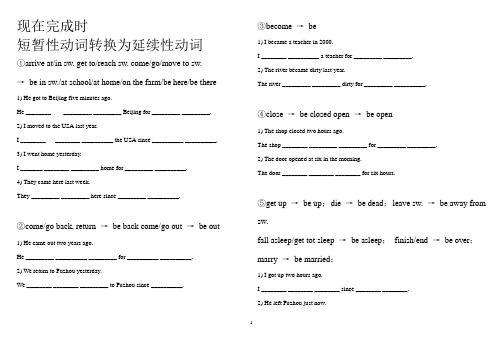
现在完成时短暂性动词转换为延续性动词①arrive at/in sw. get to/reach sw. come/go/move to sw.→be in sw./at school/at home/on the farm/be here/be there 1) He got to Beijing five minutes ago.He ________ _________ _________ Beijing for _________ _________.2) I moved to the USA last year.I ________ ________ __________ the USA since __________ __________.3) I went home yesterday.I _______ ________ _________ home for _________ __________.4) They came here last week.They _________ _________ here since _________ __________.②come/go back, return →be back come/go out →be out1) He came out two years ago.He _________ __________ _________ for __________ __________.2) We return to Fuzhou yesterday.We ________ ________ _________ to Fuzhou since __________. ③become →be1) I became a teacher in 2000.I ________ __________ a teacher for _________ _________.2) The river became dirty last year.The river _________ _________ dirty for _________ __________.④close →be closed open →be open1) The shop closed two hours ago.The shop ________ _________ _________ for _________ _________.2) The door opened at six in the morning.The door ________ ________ ________ for six hours.⑤get up →be up;die →be dead;leave sw. →be away from sw.fall asleep/get tot sleep →be asleep;finish/end →be over;marry →be married;1) I got up two hours ago.I ________ ________ ________ since ________ ________.2) He left Fuzhou just now.He _______ ________ ________ _________ Fuzhou for five minutes.3) My grandpa died in 2002.My grandpa _______ _______ ________for _______ ________.4) The meeting finished at six.The meeting ________ ______ ______ for six hours.5) I got to sleep two hours ago.I ________ _________ _________ since _________ _________.6) They married in 1990.They ________ _________ __________since _________.⑥start/begin to do sth. →do sth. ;begin →be on1) I began to teach at this school in 1995.I ____ ____ at this school since ____.2) The film began two minutes ago.The film ____ ____ ____ for ____ ____.⑦borrow →keep;lose →not have ;buy →have ;put on →wearcatch/get a cold →have a cold;get to know →know1) They borrowed it last week.They _________ _________ it since __________ __________. 2) I bought a pen two hours ago.I _________ _________ a pen for ________ __________.3) I got to know him last year.I _______ _______ him since __________ __________.4) I put on my glasses three years ago.I __________ __________ my glasses for _________ _________.⑧have/has gone to →have been inHe has gone to Beijing.He ____ ____ _____ Beijing for two days.⑨join the league/the Party/the army→be a league/a Party member/a soldier→be a member of the league/the Party→be in the league/the Party/the army1) He joined the league in 2002.He ________ _________ a _________ _________ for two years.He _______ _________ a __________ ___________ the __________ for two years. He ____________ ___________ ___________ the league for two years.2) My brother joined the army two years ago.My brother ________ __________ a ___________ for ___________ ___________. My brother __________ ___________ in ____________ ___________ for two years.。
短暂性动词与延续性动词
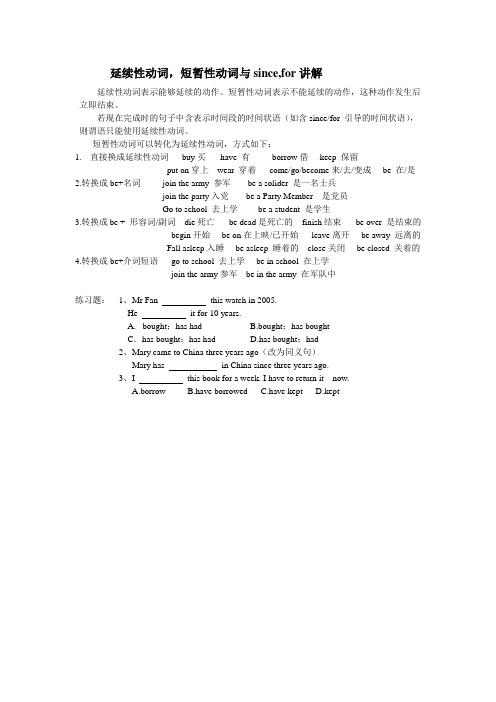
延续性动词,短暂性动词与since,for讲解延续性动词表示能够延续的动作。
短暂性动词表示不能延续的动作,这种动作发生后立即结束。
若现在完成时的句子中含表示时间段的时间状语(如含since/for 引导的时间状语),则谓语只能使用延续性动词。
短暂性动词可以转化为延续性动词,方式如下:1.直接换成延续性动词buy买-----have 有borrow借----keep 保留put on穿上---wear 穿着come/go/become来/去/变成----be 在/是2.转换成be+名词join the army 参军----- be a solider 是一名士兵join the party入党------be a Party Member 是党员Go to school 去上学-------be a student 是学生3.转换成be + 形容词/副词die死亡-----be dead是死亡的finish结束-----be over 是结束的begin开始----be on在上映/已开始leave离开----be away 远离的Fall asleep入睡----be asleep 睡着的close关闭----be closed 关着的4.转换成be+介词短语go to school 去上学----be in school 在上学join the army参军---be in the army 在军队中练习题:1、Mr Fan this watch in 2005.He it for 10 years.A.bought;has hadB.bought;has boughtC.has bought;has had D.has bought;had2、Mary came to China three years ago(改为同义句)Mary has in China since three years ago.3、I this book for a week. I have to return it now.A.borrowB.have borrowedC.have keptD.kept。
延续性动词和短暂性动词的区别
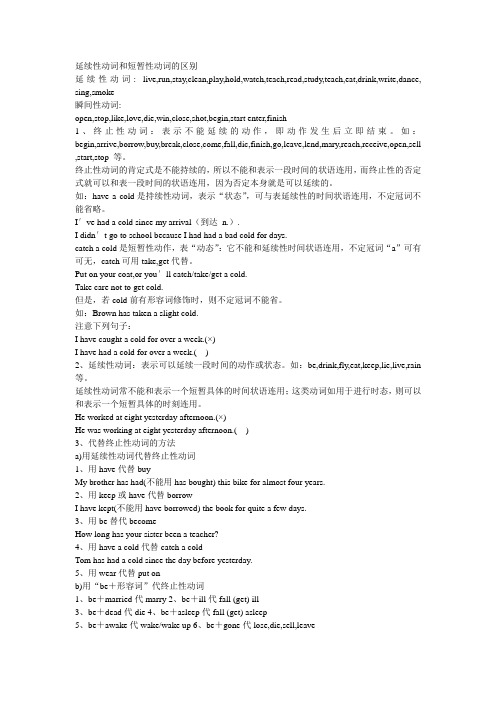
延续性动词和短暂性动词的区别延续性动词: live,run,stay,clean,play,hold,watch,teach,read,study,teach,eat,drink,write,dance, sing,smoke瞬间性动词:open,stop,like,love,die,win,close,shot,begin,start enter,finish1、终止性动词:表示不能延续的动作,即动作发生后立即结束。
如:begin,arrive,borrow,buy,break,close,come,fall,dic,finish,go,leave,lend,mary,reach,receive,open,sell ,start,stop 等。
终止性动词的肯定式是不能持续的,所以不能和表示一段时间的状语连用,而终止性的否定式就可以和表一段时间的状语连用,因为否定本身就是可以延续的。
如:have a cold是持续性动词,表示“状态”,可与表延续性的时间状语连用,不定冠词不能省略。
I′ve had a cold since my arrival(到达n.).I didn′t go to school because I had had a bad cold for days.catch a cold是短暂性动作,表“动态”:它不能和延续性时间状语连用,不定冠词“a”可有可无,catch可用take,get代替。
Put on your coat,or you′ll catch/take/get a cold.Take care not to get cold.但是,若cold前有形容词修饰时,则不定冠词不能省。
如:Brown has taken a slight cold.注意下列句子:I have caught a cold for over a week.(×)I have had a cold for over a week.()2、延续性动词:表示可以延续一段时间的动作或状态。
中考英语短暂性动词与延续性动词相互转换讲练 (4)
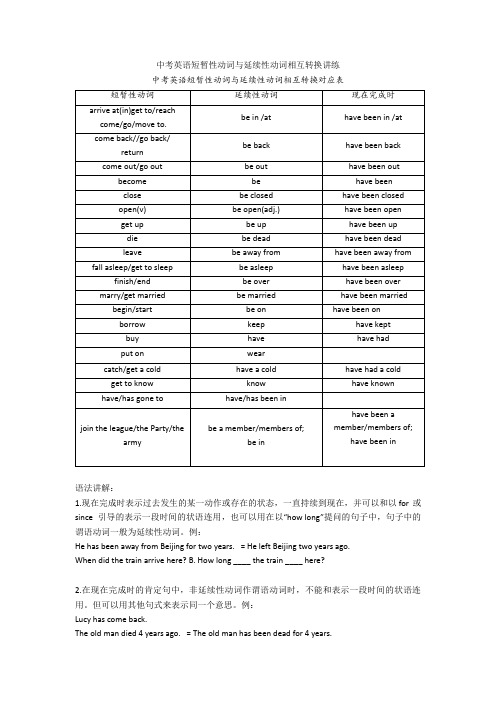
中考英语短暂性动词与延续性动词相互转换讲练中考英语短暂性动词与延续性动词相互转换对应表语法讲解:1.现在完成时表示过去发生的某一动作或存在的状态,一直持续到现在,并可以和以 for或since引导的表示一段时间的状语连用,也可以用在以“how long”提问的句子中,句子中的谓语动词一般为延续性动词。
例:He has been away from Beijing for two years. = He left Beijing two years ago.When did the train arrive here? B. How long ____ the train ____ here?2.在现在完成时的肯定句中,非延续性动词作谓语动词时,不能和表示一段时间的状语连用。
但可以用其他句式来表示同一个意思。
例:Lucy has come back.The old man died 4 years ago. = The old man has been dead for 4 years.He has been away from Beijing for two years.= He left Beijing two years ago.= It is two years since he left Beijing.= Two years has passed since he left Beijing.3.非延续性动词可以在现在完成时的否定句中作谓语,并可以与for,since引导的时间状语连用,表示动作的延续过程。
例如:She h asn’t bought any new clothes since last year.I haven’t borrowed the book for a long time.巩固习题:1. When he arrived at the bus stop, the bus ________ for 20 minutes.A. has leftB. had leftC. has been awayD. had been away2. I ______ the League for 5 years so far.A. joinedB. have joinedC. have been in3. The factory ________ since the February of 1988.A . has been open B. has opened C. was open D. opened4. Mary and Rose _______friends since they met in 2000.A. have madeB. have beenC. madeD. have become5.The meeting _______ for a week now.A. has finishedB. has endedC. has been over6.Miss Gao ______ this school for nearly 5 years.A. has been inB. has come toC. has taught7.Ben ______ a teacher for 4 years .A. has beenB. has becomeC. wasD. became8. I ______ home for a week.A. have returnedB. have been backC. returned9. How long _______ he ________ ?A. diedB. has, diedC. has, been dead10. ----- How long can I ______ the book? ------ Two weeks.A. borrowB. lendC. getD. keep11.He ________ the car for a week.A. boughtB. has boughtC. has had12.-----How long _____ you _____ ill ? -----Two weeks.A. did fallB. have, fellC. have, been13.Since 2000, he _____ his hometown.A. has leftB. has moved awayC. has been away from14.I'll lend you the book , but you can only _____ it for 2 days.A. borrowB. keepC. take15.The bus ______ on the road for 2 hours so far.A. has stoppedB. stoppedC. has been16. Tom is ill in hospital. He _______ a cold for several days.A. isB. catchesC. has caughtD. has had17.He ________ for 2 hours.A. got upB. has got upC. has been up二、英语书面表达专项训练2.下周一下午轮到你在英语课上做课堂报告, 你打算把你爸爸最近网购的音乐机器人(music robot)介绍给同学们。
短暂动词对应延续性动词变化
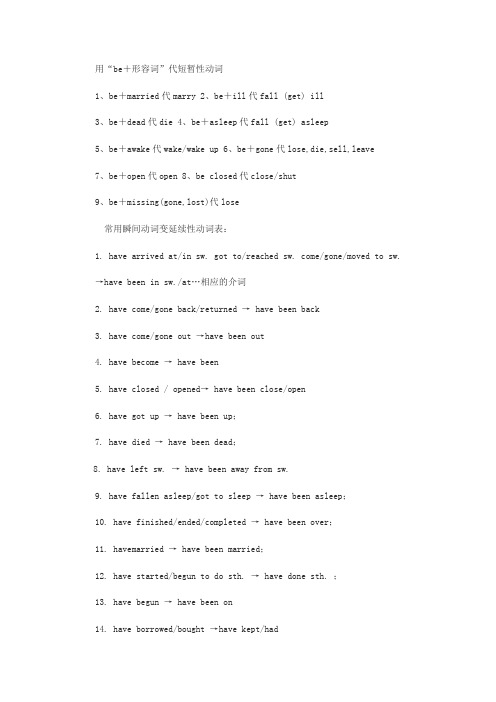
用“be+形容词”代短暂性动词1、be+married代marry2、be+ill代fall (get) ill3、be+dead代die4、be+asleep代fall (get) asleep5、be+awake代wake/wake up6、be+gone代lose,die,sell,leave7、be+open代open 8、be closed代close/shut9、be+missing(gone,lost)代lose常用瞬间动词变延续性动词表:1. have arrived at/in sw. got to/reached sw. come/gone/moved to sw. →have been in sw./at…相应的介词2. have come/gone back/returned → have been back3. have come/gone out →have been out4. have become → have been5. have closed / opened→ have been close/open6. have got up → have been up;7. have died → have been dead;8. have left sw. → have been away from sw.9. have fallen asleep/got to sleep → have been asleep;10. have finished/ended/completed → have been over;11. havemarried → have been married;12. have started/begun to do sth. → have done sth. ;13. have begun → have been on14. have borrowed/bought →have kept/had15. have lost → haven’t had16. have put on →have worn17. have caught /get a cold → have had a cold;18. have got to know → have known19. have/has gone to → have been in20. have joined/have taken part in the league/the Party/the army延续性动词与非延续性动词之间的转换:leave --- be away, borrow --- keep, buy --- have, begin/start --- be on, die --- be dead, finish --- beover, join --- be in+组织机构, be a member of+组织机构, open sth --- keep sth open, fall ill --- be ill, get up---be up, catch a cold ---have a cold, come here --- be here, go there --- be there, become--- be, come back --- be back, fall asleep --- be asleep, getto/ arrive/reach --- be (in), leave --- be away from, get to know--- know, go (get) out →be out,put on→ wear;catch a cold →have acold。
短暂性动词和延续性动词
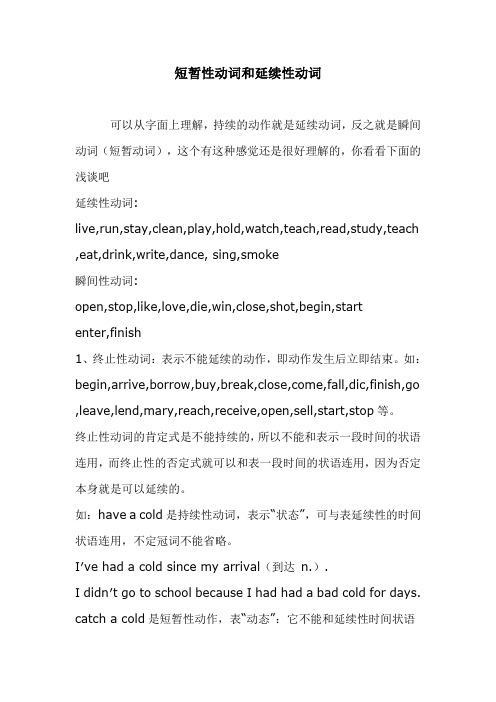
短暂性动词和延续性动词可以从字面上理解,持续的动作就是延续动词,反之就是瞬间动词(短暂动词),这个有这种感觉还是很好理解的,你看看下面的浅谈吧延续性动词:live,run,stay,clean,play,hold,watch,teach,read,study,teach ,eat,drink,write,dance, sing,smoke瞬间性动词:open,stop,like,love,die,win,close,shot,begin,startenter,finish1、终止性动词:表示不能延续的动作,即动作发生后立即结束。
如:begin,arrive,borrow,buy,break,close,come,fall,dic,finish,go ,leave,lend,mary,reach,receive,open,sell,start,stop等。
终止性动词的肯定式是不能持续的,所以不能和表示一段时间的状语连用,而终止性的否定式就可以和表一段时间的状语连用,因为否定本身就是可以延续的。
如:have a cold是持续性动词,表示“状态”,可与表延续性的时间状语连用,不定冠词不能省略。
I′ve had a cold since my arrival(到达n.).I didn′t go to school because I had had a bad cold for days. catch a cold是短暂性动作,表“动态”:它不能和延续性时间状语连用,不定冠词“a”可有可无,catch可用take,get代替。
Put on your coat,or you′ll catch/take/get a cold.Take care not to get cold.但是,若cold前有形容词修饰时,则不定冠词不能省。
如:Brown has taken a slight cold.注意下列句子:I have caught a cold for over a week.(×)I have had a cold for over a week.( )2、延续性动词:表示可以延续一段时间的动作或状态。
中考英语短暂性动词与延续性动词相互转换讲练 (6)
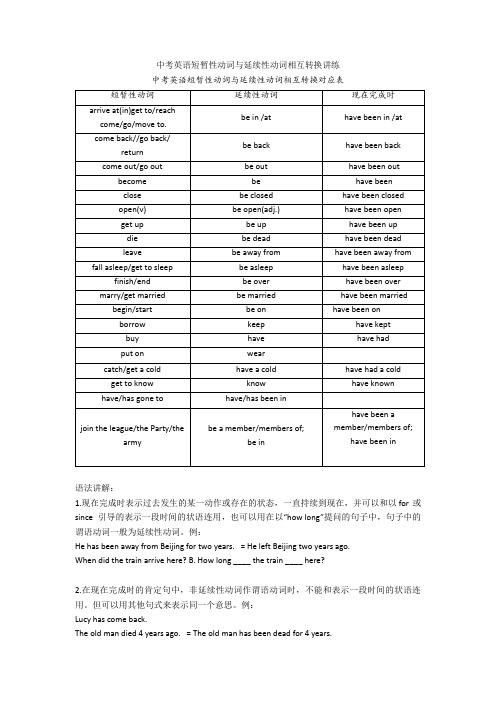
中考英语短暂性动词与延续性动词相互转换讲练中考英语短暂性动词与延续性动词相互转换对应表语法讲解:1.现在完成时表示过去发生的某一动作或存在的状态,一直持续到现在,并可以和以 for或since引导的表示一段时间的状语连用,也可以用在以“how long”提问的句子中,句子中的谓语动词一般为延续性动词。
例:He has been away from Beijing for two years. = He left Beijing two years ago.When did the train arrive here? B. How long ____ the train ____ here?2.在现在完成时的肯定句中,非延续性动词作谓语动词时,不能和表示一段时间的状语连用。
但可以用其他句式来表示同一个意思。
例:Lucy has come back.The old man died 4 years ago. = The old man has been dead for 4 years.He has been away from Beijing for two years.= He left Beijing two years ago.= It is two years since he left Beijing.= Two years has passed since he left Beijing.3.非延续性动词可以在现在完成时的否定句中作谓语,并可以与for,since引导的时间状语连用,表示动作的延续过程。
例如:She h asn’t bought any new clothes since last year.I haven’t borrowed the book for a long time.巩固习题:1. When he arrived at the bus stop, the bus ________ for 20 minutes.A. has leftB. had leftC. has been awayD. had been away2. I ______ the League for 5 years so far.A. joinedB. have joinedC. have been in3. The factory ________ since the February of 1988.A . has been open B. has opened C. was open D. opened4. Mary and Rose _______friends since they met in 2000.A. have madeB. have beenC. madeD. have become5.The meeting _______ for a week now.A. has finishedB. has endedC. has been over6.Miss Gao ______ this school for nearly 5 years.A. has been inB. has come toC. has taught7.Ben ______ a teacher for 4 years .A. has beenB. has becomeC. wasD. became8. I ______ home for a week.A. have returnedB. have been backC. returned9. How long _______ he ________ ?A. diedB. has, diedC. has, been dead10. ----- How long can I ______ the book? ------ Two weeks.A. borrowB. lendC. getD. keep11.He ________ the car for a week.A. boughtB. has boughtC. has had12.-----How long _____ you _____ ill ? -----Two weeks.A. did fallB. have, fellC. have, been13.Since 2000, he _____ his hometown.A. has leftB. has moved awayC. has been away from14.I'll lend you the book , but you can only _____ it for 2 days.A. borrowB. keepC. take15.The bus ______ on the road for 2 hours so far.A. has stoppedB. stoppedC. has been16. Tom is ill in hospital. He _______ a cold for several days.A. isB. catchesC. has caughtD. has had17.He ________ for 2 hours.A. got upB. has got upC. has been up二、英语书面表达专项训练2.假如你是李华,你的英国笔友 Jack 给你写邮件表达了想参加你校暑期为外国学生举办的汉语夏令营的愿望,希望你告知活动举办的具体时间地点,活动安排以及你的建议。
短暂动词和延续性动词

Mr. Wang has
The film has
been in been in been on been on
Beijing since five days ago.
Beijing for
five days.
6. The film began ten minutes ago. for ten minutes .
time. We haven’t seen him since 1992. She hasn’t left home all her life.
3、还可改用一般过去时来表达.
e.g. He came back a week ago.
4、也可用“It is ﹢一段时间﹢since…”句 型
来表达.
e.g. It is a week since he came back.
短
暂
性
动
词
和 延 续 性 动 词
短暂性动词也称做终止性动词、非延续性动词 或瞬间动词,表示动作不能延续,只是一瞬间就 结束的动作.
常见的短暂性动词有:come, go, arrive, reach, see, hear, close, open, leave, begin, start, lose, buy, fall, join, die, become, borrow, get up等.
②、转换成 be﹢名词; join the Party ------ be a Party member, join the army ------ be a soldier,
go to school ------ be a student.
③、转换成be + 介词短语 : go to school ------ be in school,
短暂性动词和延续性动词
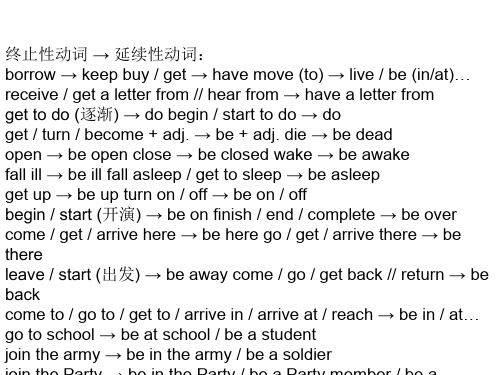
wake → be awake fall ill → be ill fall asleep / get to sleep → be asleep get up → be up turn on / off → be on / off begin / start (开演) → be on finish / end / complete → be over come / get / arrive here → be here go / get / arrive there → be there leave / start (出发) → be away come / go / get back / return → be back come to / go to / get to / arrive in / arrive at / reach → be in / at…
go to school → be at school / be a student join the army → be in the army / be a soldier join the Party → be in the Party / be a Party member / be a member of the Party
终止性动词 → 延续性动词: borrow → keep buy / get → have move (to) → live / be (in/at)… receive / get a letter from // hear from → have a letter from get to do (逐渐) → do begin / start to do → do get / turn / become + adj. → be + adj. die → be dead open → be open close → be closed wake → be awake fall ill → be ill fall asleep / get to sleep → be asleep get up → be up turn on / off → be on / off begin / start (开演) → be on finish / end / complete → be over come / get / arrive here → be here go / get / arrive there → be there leave / start (出发) → be away come / go / get back // return → be back come to / go to / get to / arrive in / arrive at / reach → be in / at… go to school → be at school / be a student join the army → be in the army / be a soldier
